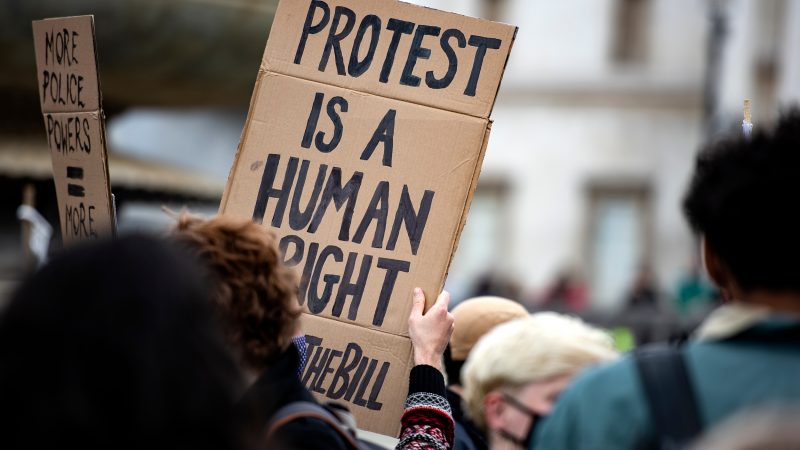
Both the Prime Minister and the Chancellor used this year’s party conference to quip that theirs is not a party of protest. But with demonstrators being increasingly criminalised for speaking up, and negative narratives of protest becoming more entrenched in the public consciousness, how can Labour reconnect to its history and offer a more compelling and hopeful vision of protest?
Two pieces of legislation, passed under the previous Government, the Policing Act and the Public Order Act, have severely eroded the right to protest. They have imposed restrictions, introduced new offences, increased sentencing thresholds, and criminalised thousands of protesters.
No longer can a protest be too ‘noisy’, or cause ‘more than minor’ disturbance. Protest has always been a qualified right, but the space around it has significantly contracted.
But this legislation did not occur in a vacuum. It occurred within the context of an increasingly negative narrative around protest from those in power. Protesters have been framed as selfish and intent on disrupting everyone’s lives. Protest has been cast as deeply unpopular.
Shifting public views
It has been a very effective sleight of hand. It has turned people’s attention to the tactics used by a very small minority of protesters to justify changing the law on all protests.
It is also, as it turns out, unfounded. A recent report by think-tank Demos revealed that the British public overwhelmingly support the right to protest. Concerns about disruption are real, and strong. However the public’s views shifted once they heard more about the history of protest and protest legislation, and after hearing from people who have taken part in protest more recently.
The supposed unpopularity of protest has been vastly overstated. But it goes without saying that a right does not need to be popular to be upheld in the law. There are important lessons here for the future.
When rights-limiting legislation is justified based on the popularity of said cause, this should be treated with deep scepticism by those who care about democracy and the rule of law.
READ MORE: Sir John Curtice warns Labour victory in 2029 not guaranteed
For those of us who advocate for the right to protest, what are the openings now under Labour?
Labour in power feels the need to be strong on law and order. A full repeal of the Policing Act and the Public Order Act may be a step too far in a first term. But the Prime Minister has been clear about his rejection of populism and knee jerk legislation. There is an opportunity here.
The Prime Minister’s brand is all grown-up politics and probity. Indeed, in the appointment of Lord Hermer KC as Attorney General, one of the few departures from the Shadow Cabinet, there is a deliberate move to emphasise within his Cabinet the rule of law and respect for human rights.
One of the relationships he and Home Secretary Yvette Cooper have been attempting to rebuild is with the police, which was severely tested during Suella Braverman’s tenure as Home Secretary and constitutionally tenuous critiques of how protests should be policed.
A party of protest
There is an opportunity for an independent review of protest legislation and the policing of protest, which centres the voices and experiences of people who have borne the brunt of the expansion of anti-protest laws in recent years.
We are also seeing growing interest in a Northern Ireland style Parades Commission, an independent body which resolves disputes caused by contentious marches.
Promoting mediation and understanding between different stakeholders would be a credible departure from the Conservatives’ playbook on protest, without undermining Labour’s law and order credentials.
READ MORE: ‘Labour needs to listen: how the party can stem the tide of right wing populism’
Notwithstanding the Prime Minister and the Chancellor’s assertions, Labour is the party of protest. It is the party of trade unionism, of Peterloo, of social change. Even a more muted descriptor, progressive, hints at the change project which is at the heart of the party.
There is a serious conversation to be had within Labour as to what place protest can hold within it. How can it mobilise the history of protest, which is intertwined with the great victories of the coalitions which form Labour, to foreground a compelling, unifying and British narrative?
Protest as one of the mechanisms for social change, protest as communities coming together, protest as hope for a better world. These are all visions for the taking.
Recap on all of the news and debate from party conference 2024 by LabourList here.
SHARE: If you have anything to share that we should be looking into or publishing about this story – or any other topic involving Labour– contact us (strictly anonymously if you wish) at [email protected].
SUBSCRIBE: Sign up to LabourList’s morning email here for the best briefing on everything Labour, every weekday morning.
DONATE: If you value our work, please donate to become one of our supporters here and help sustain and expand our coverage.
PARTNER: If you or your organisation might be interested in partnering with us on sponsored events or content, email [email protected].




More from LabourList
‘The hope that kills you’: Reflections from the final day in Gorton and Denton
MPs, union leaders and organisations react to ‘bruising’ Gorton and Denton result
A gory night for Labour